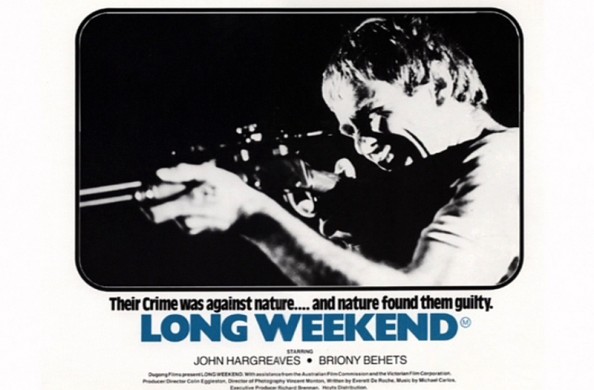
Miskatonic Institute of Horror Studies – London
Instructor: Lindsay Hallam
Date: 19 January 2017
Time: 7-10pm
Venue: Horse Hospital
Address: Colonnade, Bloomsbury, London WC1N 1JD
Prices: £10 advance / £8 concs / £11 door
Miskatonic website
In the 1970s the Australian film industry underwent a boom that is still unprecedented to this day, experienced two-fold with a strain of respectable arthouse period dramas, and a bunch of down-and-dirty, violent and sexy exploitation films. This lecture will explore how Australian horror cinema of this period incorporates a subversive streak that critiques Australian history and culture through the theme of revenge. It is a theme that is prevalent throughout these films, in particular in the spate of eco-horror films, exemplified by the likes of Long Weekend (1978), and Razorback(1984), where nature itself, often in the form of a rampaging nonhuman animal, seeks to avenge the past exploitation and abuse perpetrated against the land and its native inhabitants.
As well as nature seeking revenge, the fight for survival against human or supernatural forces is also presented in films such as Wake in Fright (1971), The Cars That Ate Paris (1974), The Last Wave (1977) Patrick (1978), Roadgames (1981), and Fair Game (1986), and vengeance even comes from beyond the grave in Next of Kin (1982) and BeDevil (1993). Given that Australia’s colonial past is one that encompasses genocide of the indigenous population, mass animal extinction, environmental destruction, and the glorification of masculine ‘mateship’ that carries a nasty undercurrent of misogyny, this lecture will discuss how it is in these revenge narratives that the darker aspects of Australian national identity are explored and indicted. The class will further investigate how this fascination with revenge for past (and present) wrongs still continues in contemporary Australian genre cinema, in films such as Dying Breed (2006), The Horseman (2008), The Loved Ones (2009), Mad Max: Fury Road (2015) and Red Christmas (2016).
About the instructor:
Lindsay Hallam is a Senior Lecturer in Film at the University of East London. She is the author of the book Screening the Marquis de Sade: Pleasure, Pain and the Transgressive Body in Film (McFarland 2012), and has directed the documentary Fridey at the Hydey (2013). Lindsay has contributed to the collections Trauma, Media, Art: New Perspectives (Cambridge Scholars Publishing, 2010), Dracula’s Daughters: The Female Vampire on Film (Scarecrow Press, 2013), Fragmented Nightmares: Transnational Horror Across Visual Media (Routledge, 2014), Critical Insights: Violence in Literature (Salem Press, 2014), and the journals Asian Cinema, Senses of Cinema, Cine-Excess and Journal of Italian Cinema and Media Studies. She is interested in all aspects of horror cinema, having written on topics such as female vampires, torture porn and post-9/11 trauma, mad science films, Italian horror, Australian eco-horror, and the television series Twin Peaks.
About the Miskatonic Institute:
Named for the fictional university in H.P. Lovecraft’s literary mythos, The Miskatonic Institute of Horror Studies is a non-profit, community-based organization that started in Canada, founded by Kier-La Janisse in March of 2010. The school currently has branches in Montreal and London, with Miskatonic London operating under the co-direction of Kier-La Janisse and Electric Sheep Founder/Editor Virginie Sélavy.
All classes take place at the historic Horse Hospital, the heart of the city’s underground culture. Season ticket is £35 and will be available shortly. Individual class tickets are £10 advance / £11 on the door / £8 concessions and will be available 30 days in advance of each class.
For full details of the next courses please check the Miskatonic website. For all enquiries, please email Miskatonic.london[at]gmail.com.
